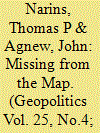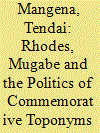|
|
|
Sort Order |
|
|
|
Items / Page
|
|
|
|
|
|
|
| Srl | Item |
| 1 |
ID:
172811


|
|
|
|
|
| Summary/Abstract |
Wonder Woman (2017) has been one of the most lucrative entries in the recent superhero film canon. With a female lead and director, it has also proven a rich text for feminist analysis. Here, the film’s engagement with questions of gender, aesthetic judgment and disability is explored through the lens of feminist geopolitics, and connected to the alignment between immorality and disfigurement in Hollywood more broadly. It is suggested that aesthetic value is used in the film as a key organizing principle for spatial and geopolitical claims. Through this analysis, the paper suggests the potential for further studies of disability, including disfigurement, in popular geopolitics.
|
|
|
|
|
|
|
|
|
|
|
|
|
|
|
|
| 2 |
ID:
172810


|
|
|
|
|
| Summary/Abstract |
The notion of a Mediterranean Neighbourhood points to how a specific geopolitical space is scripted, imagined and then translated into practice through the European Union’s foreign policy towards this region. I contend that the Arab Spring took place within this European Neighbourhood Policy (ENP) framework contesting many of its underlying principles. This wave of social upheaval across a marked EU vs. non-EU space enabled a series of geographical imaginations and spatial practices able to rethink the Mediterranean region otherwise. This paper introduces three concepts developed by Hamid Dabashi to the geographical debates rethinking Europe’s contours through a post/de-colonial analytical lens. Drawing from the spatial thinking that characterises Dabashi’s recent work, this paper contributes to the rich critical literature on the ENP’s macro-regional imaginary. Concretely, building on Dabashi’s notion of “liberation geographies”, I emphasise how recent organising as well as ongoing migratory movements in the region constitute serious geopolitical interlocutors able to produce alternative Mediterranean spaces.
|
|
|
|
|
|
|
|
|
|
|
|
|
|
|
|
| 3 |
ID:
172813


|
|
|
|
|
| Summary/Abstract |
This paper reviews the genealogy of ‘Chinese’ political geography, which, to a certain extent, can be read as a national report of the status of political geography in Chinese scholarship. It begins by outlining the short duration of the development of political geography in China, compared to the longer history of western political geography. Looking at the extant studies related to political geography in China, this paper suggests an existence of a duality in this field. One strand of scholarship is termed ‘exogenous political geography’, which is largely influenced by western scholarship with a particular focus on theories and vocabularies from classical geopolitics and geo-economy. The other strand is termed as ‘endogenous political geography’, which covers rich topics, including, yet not limited to, political and geographical views of inter-state relationships, central-local relationships and emperor-people relationships. Such a duality is important for understanding the condition of current political geography in China. The dualised understanding, however, seems to have undermined the comprehensiveness of political geography in China. In this regard, this paper calls for a more complete, integrated and critical agenda for political geography in China.
|
|
|
|
|
|
|
|
|
|
|
|
|
|
|
|
| 4 |
ID:
172808


|
|
|
|
|
| Summary/Abstract |
The 2015 earthquakes in Nepal killed more than 9,000 people, displaced millions of people and deeply affected the economy. The earthquakes and reconstructions processes also transformed Nepal into a complex terrain of geoeconomic accumulation and geopolitical manoeuvring, including major international capital flows, the promulgation of a new constitution, an economic blockade by India and the expansion of trade corridors with China. Building on critiques of ‘disaster capitalism’, we propose and mobilize the concept of ‘geo-logics of power’ to draw further attention to the materialities of geopolitical and geoeconomic processes shaping reconstruction in post-earthquake Nepal. Focusing on two trans-Himalayan corridors connecting Nepal and China, we argue that the Nepal experienced a particular form of disaster capitalism: one in which the geo-logics of power – including trans-Himalayan discourses, practices, and materialities – came to shape political and economic transformations of a country long portrayed as a ‘buffer’ state between Indian and China. More broadly, we suggest that geo-logics of power result from a combination of geopolitical and geoeconomic power dynamics informed by geological formations and associated socio-natural processes.
|
|
|
|
|
|
|
|
|
|
|
|
|
|
|
|
| 5 |
ID:
172809


|
|
|
|
|
| Summary/Abstract |
The paper examines the recent security interventions at the northern Finnish-Swedish border crossing point in the town of Tornio, the particular focus being on the 2015 migration influx in which Finland received a tenfold increase in asylum applications compared with the previous years (~3000 → 32 476 asylum applicants). The resultant securitization of the Finnish-Swedish border and the organization of asylum reception practices, in which nongovernmental organizations played an important role, created tension between the Finnish and Swedish authorities, borderlanders, and within wider Finnish society. An empirical study of various materials (documents, interviews, social media debates and media reports) is used to examine the coexistence and intertwining of different border securitization practices and discourses. The analysis is structured around three story lines that disclose border securitization as multiple and aims to problematize the assumption that states, as entities holding sovereign authority, fully determine matters of border securitization. Firstly, the state intervention examined here occurred through and fully depended on collaboration with local authorities and nongovernmental actors. Secondly, nationalistic groups mobilized demonstrations against immigration and started independent street patrols in the name of security, throwing into question the effectiveness and authority of the state government in matters of border securitization. Thirdly, the discourses of the securitized Finnish-Swedish border reflect the wider solidarity crisis between EU countries with respect to shared sovereignty. The study complicates the understanding of border securitization as a straight forward state effort and provides a picture of a hybrid border securitization environment.
|
|
|
|
|
|
|
|
|
|
|
|
|
|
|
|
| 6 |
ID:
172807


|
|
|
|
|
| Summary/Abstract |
Historical and conventional international relations (IR) frameworks describe the Belt Road Initiative (BRI) as representing a newly ambitious Chinese drive into global politics that positions China as moving away from its long-time reticence towards foreign entanglements. This raises a contradiction of China being at one and the same time both a defender of its own territorial sovereignty while also being engaged in various projects, particularly the BRI and the associated Asian Infrastructure Investment Bank (AIIB), that point in completely different directions. This paper seeks to build upon and move beyond conventional framings to understand how the BRI represents a conflict over the workings of state sovereignty that such frameworks have trouble addressing. We argue that the absence of an official Chinese government BRI map promotes a ‘useful fuzziness’ with regards to China being open to crafting a new as of yet undefined geopolitical identity. In light of the absence of such a map, this work considers key ideas relating to China’s geopolitical expansion via the BRI in terms of so-called sovereignty regimes – the idea that various practices of authority and control emanating originally from states take different geographical shapes. Conflicts arise when a state, such as China, finds itself caught between the operational imperatives of multiple regimes. By identifying the current sovereignty dynamics raised by the BRI in light of the relevant, yet distinctive historical experience of the Marshall Plan, this work can be used as a model for understanding how China’s current leadership is managing the debate of simultaneously protecting ‘strong borders’ yet also promoting a policy of ‘going out’.
|
|
|
|
|
|
|
|
|
|
|
|
|
|
|
|
| 7 |
ID:
172812


|
|
|
|
|
| Summary/Abstract |
The development of radio as a communication and broadcasting technology has been vital to popular, formal and practical geopolitics. This paper contributes to the nascent literature on assemblage thought in geopolitics by considering radio as a historical iteration of “the media”. Through this dialogue, it is suggested that British Broadcasting Corporation (BBC) radio is both a material and discursive assemblage, operating at multiple scales, sites and intensities of governance. The paper argues that radio cannot be seen simply as a vehicle for producing popular geopolitical imaginaries, nor as a neutral military or cultural diplomatic tool. Contributing to the use of assemblage and actor–network thought in historical-popular geopolitics, the paper begins by articulating the benefits of certain elements of these theoretical registers to the sub-field in general, before moving onto a series of empirical fragments from the archive to illustrate these abstractions in a more concrete manner. First, it does so by considering the early governance and regulation of radio in the 1920s, then the forces producing the BBC’s Middle Eastern Relay network during the late 1960s. The paper concludes with a further call to take materiality seriously, particularly in future popular geopolitical research dealing with media networks.
|
|
|
|
|
|
|
|
|
|
|
|
|
|
|
|
| 8 |
ID:
172815


|
|
|
|
|
| Summary/Abstract |
This paper is based on former Zimbabwean President Robert Gabriel Mugabe’s ninety-third birthday celebrations. It uses and goes beyond the said ceremony to interrogate the politics of commemorative toponyms in post-independence Zimbabwe. The event took place on 25 February 2017 at a school whose name Rhodes Estate Preparatory School (REPS) was changed to Matopos Junior School prior to the celebrations. The methodological framing of this discussion consists of a critical reading of the media’s representation of the name change and the debates that followed. Reference is specifically made to two Zimbabwean newspapers, The Patriot, which featured the story on 2 March 2017 under the heading “Rhodes ‘legacy’ finally put to rest” and the ZimEye’s story of 26 February 2017 headlined “Mugabe removes Rhodes.” Theoretically, the paper is framed within the critical approach to toponymy that interprets commemorative place-nomenclature as political arenas which could be used to think through issues of history and memory. In particular, it is argued in this paper that in post-independence Zimbabwe, place names, especially commemorative toponyms, are political spaces par excellence which we can use to study not only the country’s colonial history but also its postcolonial realities.
|
|
|
|
|
|
|
|
|
|
|
|
|
|
|
|
| 9 |
ID:
172814


|
|
|
|
|
| Summary/Abstract |
What explains the differences in the Sino-Russian oil and gas cooperation? Overall, I suggest, the several trajectories are explained by the dissimilarities of oil and gas as commodities and potential foreign policy tools. These differences, along with other factors, such as corporate culture and individual personalities, shed light on the strategies of Russia’s gas conglomerates, Gazprom and Rosneft. Yet, if a more nuanced understanding of variation within these energy markets illuminates the reasons behind the sequencing of oil and gas cross-border pipeline projects, what explains the particular timing of the landmark 2014 gas deal? Why after 15 years of stalemate in the Sino-Russian gas cooperation did breakthroughs occur in 2014? And what explains the modesty of the record in gas cooperation to date? Many factors are undoubtedly involved, both economic and political; however, I contend that the conclusive factor can be found in underlying domestic politics.
The article outlines the role of national narratives in driving both Russia and China’s energy foreign policy and goes on to argue that the Sino-Russian gas breakthrough in 2014 was due to the peculiar way in which domestic factors paired with international circumstances to produce the outcome at that particular moment.
|
|
|
|
|
|
|
|
|
|
|
|
|
|
|
|
|
|
|
|
|